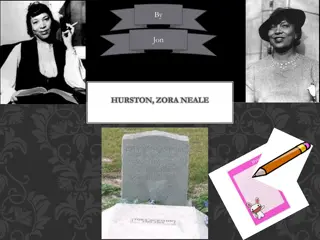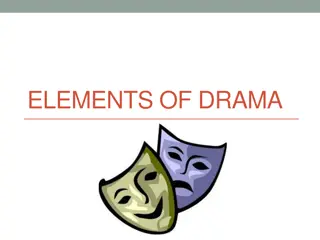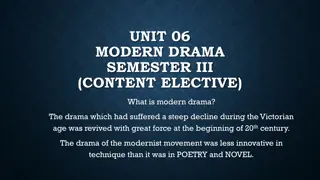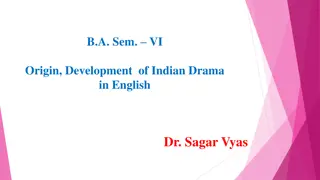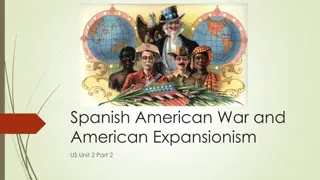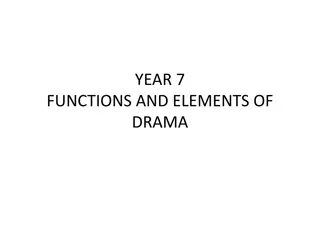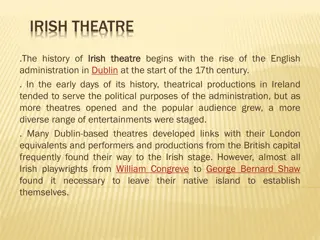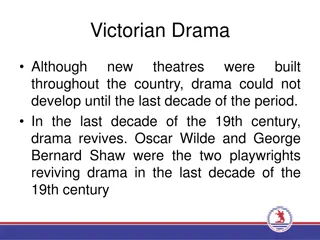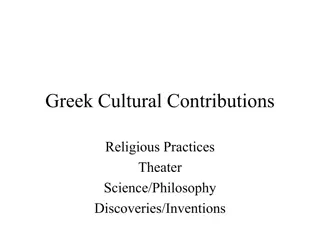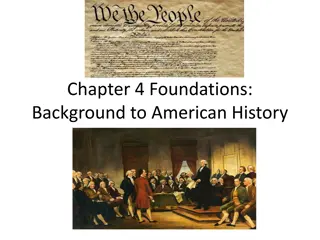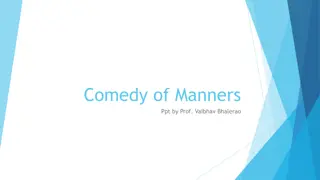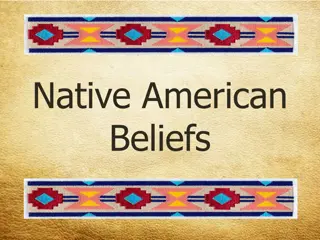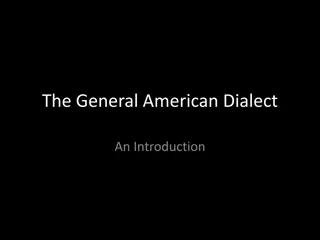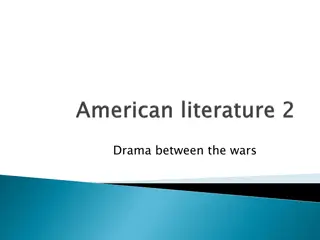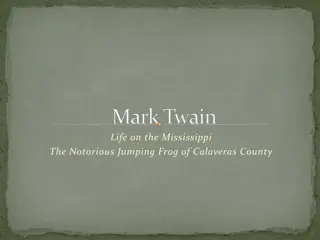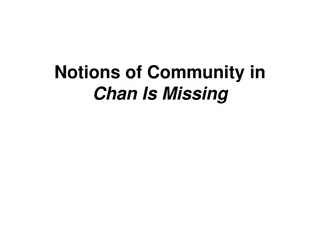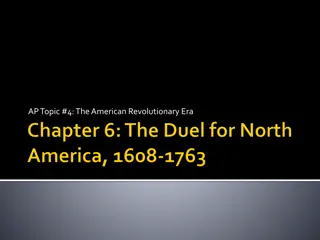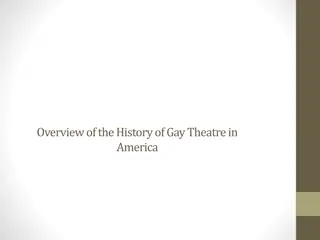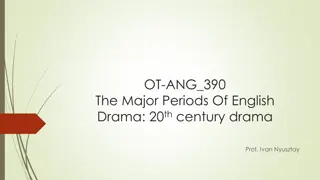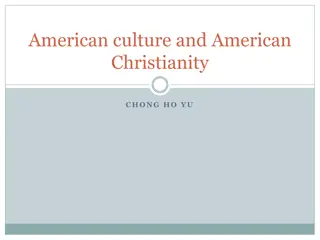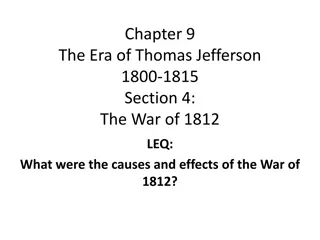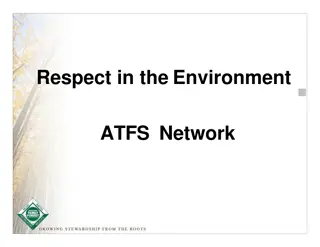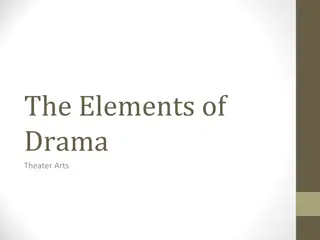Liberty & The Age of Enlightenment The American Battlefield Trust
The Age of Enlightenment, with its emphasis on natural law, liberty, progress, and constitutional government, greatly influenced American thinking and the Revolutionary War. Key figures like John Locke and Sir William Blackstone contributed ideas of social contract and law that shaped American gover
2 views • 15 slides
Zora Neale Hurston: African-American Writer of the Harlem Renaissance
Zora Neale Hurston, born in Notasulga, Alabama, in 1891, was a prominent African-American writer known for her works reflecting the African-American culture and folklore. Growing up in Eatonville, Florida, and later studying at Barnard College, she stood out among her contemporaries for her portraya
2 views • 4 slides
Understanding the Elements of Drama and Theater History
Drama, originating from the Greek verb "dran," involves acting and storytelling in front of an audience. Explore the key aspects, from the Globe Theater in London to dramatic structure, actors, and speech forms like dialogue and monologue. Learn about the crucial components such as playwrights, acto
4 views • 22 slides
Overview of AANAPISI Program in the United States
The Asian American and Native American Pacific Islander Serving Institutions (AANAPISI) Program aims to support institutions with a minimum of 10% Asian American and Native American Pacific Islander undergraduate enrollment. Currently, there are 54 funded AANAPISI institutions across 16 states and t
0 views • 13 slides
Exploring Modern Drama: History and Characteristics
Modern drama, revived in the early 20th century after a decline in the Victorian age, encompasses realism, plays of ideas, romanticism, and poetic elements. English drama during the modernist period is categorized into phases marked by influential playwrights like Henrik Ibsen, G.B. Shaw, T.S. Eliot
0 views • 9 slides
Origin and Development of Indian Drama in English
Indian English Drama has a rich history, starting from the Sanskrit plays of the Vedic Age to prominent playwrights like Rabindranath Tagore and Sri Aurobindo Ghosh. The genre saw a resurgence in the 20th century with significant contributions from various playwrights marking its evolution through s
0 views • 8 slides
Evolution of American English Vocabulary and Language Features
American English exhibits arachaic features and early changes in vocabulary due to colonial influences and the distinct political and administrative system. The language has preserved old-fashioned elements from the seventeenth and eighteenth centuries, while also incorporating new words inspired by
0 views • 5 slides
Understanding the Structure of Plays in Theatre Arts
Playwrights express ideas and convey messages through the structure of their plays. Analyzing a play's parts, arrangement, and meaning helps audiences grasp the central themes and messages. Key elements like the opening situation, initial incident, rising and falling action, climax, denouement, conf
0 views • 13 slides
Exploring Restoration Drama and Prose in the Era of Charles II
In 1660, with Charles II's ascent to the throne, Restoration literature saw a revival alongside the political landscape. Playwrights like John Dryden and Thomas Otway contributed significant works, with genres ranging from heroic plays to satirical comedies. The era also witnessed the emergence of t
1 views • 12 slides
Spanish-American War and American Expansionism: A Look Back in History
Explore the causes and impacts of the Spanish-American War, including the influence of Yellow Journalism, nationalism, and imperialism on American expansionism during the late 1800s. Learn about key figures like Theodore Roosevelt and the Rough Riders, and the significance of policies like the Monro
0 views • 25 slides
Understanding the Functions and Elements of Drama in Year 7 Curriculum
Explore the functions and elements of drama with Year 7 students in this engaging lesson. Understand how drama educates, informs, entertains, promotes tolerance, and more. Dive into the key elements like script, plot, diction, characterization, actors, and stage. Learn about playwrights and categori
0 views • 9 slides
History and Evolution of Irish Theatre
Irish theatre has a rich history intertwined with politics and cultural developments. From serving political purposes in the 17th century to nurturing indigenous writers and performers in the 20th century, Irish theatre has seen significant evolution. Dublin has been a key hub for theatrical product
0 views • 24 slides
Cultural Awareness for Drug Courts Working with Native American Participants
Understanding the cultural nuances of Native American communities is crucial for Drug Courts collaborating with Tribal Healing to Wellness Courts. This involves acknowledging tribal sovereignty, regional and cultural differences, customs, spirituality, and communication styles unique to American Ind
0 views • 22 slides
Native American Repatriation and NAGPRA Overview
The Native American Graves Protection and Repatriation Act (NAGPRA) enacted since November 1990 establishes ownership of cultural items excavated on Federal or Tribal land. It requires returning such items to Native American descendants and affiliated tribes. The Act also criminalizes trafficking in
1 views • 8 slides
Revival of Drama and Poetry in Victorian Era
Drama in the Victorian era saw a revival in the last decade of the 19th century with playwrights like Oscar Wilde and George Bernard Shaw. Alongside, Victorian poetry explored themes of love and time in various aspects, with poets like Lord Alfred Tennyson experimenting with narrative poems and dram
1 views • 6 slides
Insights into Greek Theatre's Renowned Playwrights and Dramatic Elements
Greek theatre history and key figures, including important playwrights like Aeschylus, Sophocles, and Euripides. Aristotle's theories on drama elements, Thespis' innovations, and Aristotle's Unities of Drama are explored. The impact of these elements and playwrights on ancient Greek theatre is highl
7 views • 9 slides
Greek Cultural Contributions: From Olympics to Theater
Ancient Greek civilization made significant cultural contributions in various aspects such as religious practices, theater, and scientific discoveries. The Greeks had a rich tradition of honoring their gods through events like the Olympics and theatrical performances that continue to fascinate audie
4 views • 26 slides
American Revolutionary Era: Key Events and Figures
The American Revolutionary Era marked by the formation of the Constitution, Washington's militia, key figures like Jonathan Trumbull and John Peter Muhlenberg, the emergence of American culture, the Articles of Confederation, and calls for a stronger government. This period saw a shift towards a mor
0 views • 17 slides
Greek Tragedy: From Oedipus Rex to Sophocles' Legacy
Greek tragedy, rooted in societal changes of Greek culture, explores the arrogance of tragic protagonists like Oedipus. The form and structure of tragedies aim to evoke catharsis in audiences through a journey of fear and emotions. Playwrights like Aeschylus, Euripides, and Sophocles contributed dis
0 views • 13 slides
Exploring the Comedy of Manners in English Literature
Comedy of manners is a genre of realistic, satirical comedy that critiques the social conventions and manners of sophisticated societies. Originating in Classical Greece and flourishing during the Restoration period in England, it employs witty dialogue and clever plots to offer social commentary. N
1 views • 6 slides
Exploring Native American Beliefs and Spiritual Practices
Delve into the rich tapestry of Native American beliefs, traditions, and spiritual practices, including their diverse worldviews, sacred connections to nature, and unique cultural expressions. Discover the origins of terms like "Indian" and the vast linguistic diversity among different Nations. Cont
3 views • 13 slides
Washington Irving: Father of American Fiction and Pioneer of American Romanticism
Washington Irving, an influential American author of the early 19th century, is revered as the Father of American fiction. Known for iconic works like "The Legend of Sleepy Hollow" and "Rip Van Winkle," Irving played a crucial role in establishing American literature as an independent art form. His
1 views • 14 slides
Overview of the General American Dialect
The General American Dialect, also known as GenAm, is a widely preferred dialect of English characterized by minor differences in pronunciation compared to regional American accents. It is distinct from Southern, Midwestern, and Northeastern accents and is one of the two global English dialects alon
0 views • 13 slides
Drama Between the Wars: Evolution of American Theater
Exploring the evolution of American drama between the wars, from the Puritan rejection of theater to the emergence of American playwrights and the influence of European masters. The rise of popular forms like vaudeville and the impact of theatrical companies post-WWI, with a focus on key figures lik
0 views • 10 slides
Mark Twain's Humorous Tales and Regionalism in American Literature
Mark Twain, a master of humor and regionalism, depicted American culture in a distinctive way through his works such as "The Notorious Jumping Frog of Calaveras County" and "Life on the Mississippi." His stories showcase exaggerated characters, humorous situations, and unique dialects, reflecting th
0 views • 8 slides
Redefining Irish Identity in a Globalized World
Exploring the complexities of Irish identity in a post-colonial, globalized society through the lenses of cultural fragmentation, intercultural exchange, and the evolving narratives of contemporary Irish playwrights. The discourse delves into the challenges of maintaining a distinct Irish identity w
2 views • 15 slides
American History Curriculum for Grade 11 - Semester 1
This American history curriculum for Grade 11 Semester 1 covers key topics such as the Declaration of Independence, American Revolution, industrialization, urbanization, immigration, imperialism, and the United States' emergence as a world power. Students will examine diverse aspects of American his
0 views • 11 slides
Unit Assessment Review: U.S. Imperialism History Lesson
Review session for upcoming history unit assessment on U.S. Imperialism. Topics covered include key events such as the Philippines under American control, reasons for Mark Twain's anti-Imperialist stance, factors driving American foreign policy towards imperialism, the case of Hawaii's Queen Liliuok
0 views • 15 slides
Exploring Asian American Identity Through "Chan Is Missing" by Wayne Wang
Chan Is Missing" (1982) directed by Wayne Wang is a groundbreaking Asian American independent feature film that delves into themes of Asian American identity, hyphenated identity, assimilation, and hybridity. The film, shot on a shoestring budget in San Francisco's Chinatown, showcases the community
0 views • 26 slides
The American Revolutionary Era Overview
The American Revolutionary Era marked a period of intense rivalry between France, England, and Spain for control of North America, leading to conflicts like the French & Indian War. Key events such as the founding of Quebec, exploration by Robert de La Salle, and establishment of New Orleans shaped
0 views • 39 slides
Evolution of Gay Theatre in America
Gay theatre in America has overcome societal challenges, censorship, and stereotypes to emerge as a vibrant and essential part of the theatrical landscape. From the early struggles of gay playwrights like Oscar Wilde and Tennessee Williams to the groundbreaking works of the Caffe Cino and the impact
0 views • 6 slides
Exploring the Evolution of English Drama in the 20th Century
In the realm of English drama in the 20th century, significant periods such as Modern British Drama, Naturalism, and the works of George Bernard Shaw shaped the theatrical landscape. From the rejection of past ideals to the emergence of new social commentary, playwrights like Shaw and Ibsen challeng
0 views • 39 slides
Influence of American Culture on American Christianity: A Critical Analysis
This content explores the relationship between American culture and American Christianity, discussing how religion reflects the cultural values of individualism, optimism, and the concept of a blessed nation. It delves into the concept of Biblical individualism, the influence of prosperity gospel, a
1 views • 7 slides
The World of Restoration Comedy: Satire and Society in 17th Century London
The Restoration era saw the rise of Comedy of Manners, reflecting the upper class lifestyle with wit and satire. Playwrights like William Wycherley and William Congreve crafted plays that critiqued societal norms, focusing on themes of love, marriage, and social conduct in London. The plays feature
0 views • 4 slides
The War of 1812: Causes, Events, and Effects
The War of 1812 was influenced by issues such as British impressment of American sailors, arming Native Americans, and trade restrictions. Despite opposition, President James Madison declared war in 1812. The conflict marked a period of American nationalism, with War Hawks pushing for war and Doves
0 views • 16 slides
Comedy Evolution in Restoration Drama
Explore the evolution of comedy in Restoration drama, from the types of comedy to the major playwrights and their contributions. Learn about the dramatic and theatrical themes, conventions, and trends of the period 1660-1709, including the shift towards humane intrigue comedy and the influence of Sp
0 views • 15 slides
Promoting Respectful and Safe Environments in the American Forest Foundation
This content highlights the importance of maintaining a respectful and safe environment, particularly within the American Forest Foundation and the American Tree Farm System. It emphasizes understanding and appreciating the distinguishing characteristics of individuals, recognizing and addressing ha
0 views • 35 slides
American Literature Through the Ages
Explore the rich tapestry of American literature covering American Indian culture, New England Puritanism, the 18th century American Enlightenment, and the American Renaissance. Discover the oral traditions of American Indian tribes, the puritanical values of New England, the democratic origins of A
0 views • 17 slides
Evolution of Great American Playwrights: Ibsen to Williams
Great American playwrights like Henrik Ibsen, Eugene O'Neill, Tennessee Williams, and Arthur Miller have made significant contributions to the world of theatre. They have explored timeless themes such as human behavior, society, and the struggle between illusion and reality. With regional connection
0 views • 14 slides
Understanding Drama: The Art of Theater Expression
Drama, originating from the Greek word "Dran" meaning to act, is a form of storytelling performed in front of an audience. It differs from prose and poetry by providing a unique experiential aspect through live enactments. Essential elements such as playwrights, actors, acts, scenes, and dramatic sp
0 views • 15 slides

